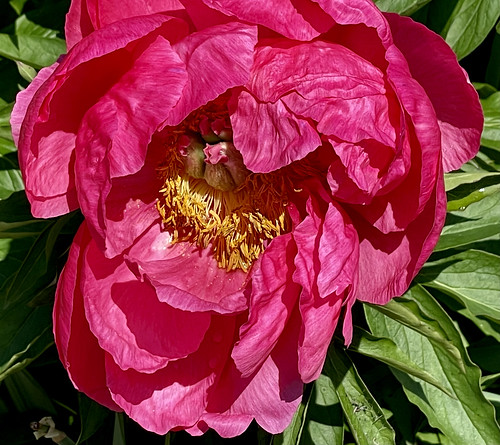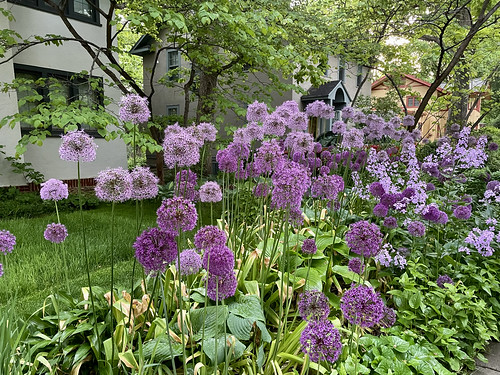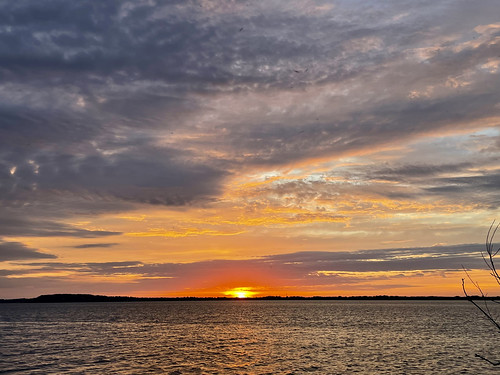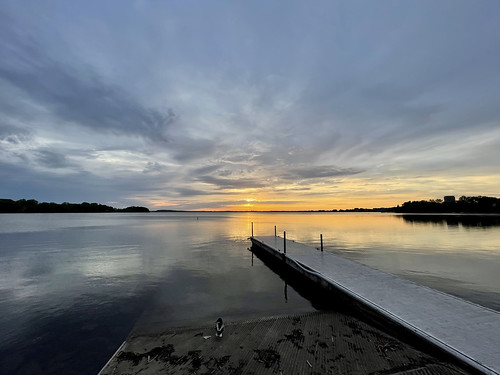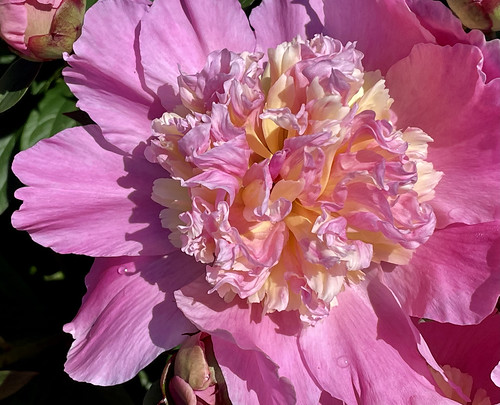
May 22, 2021
Alliums still peaking.
"When you loosen yourself, as I tried to, from all the obvious delusions—religion, ideology, Communism—you’re still left with the myth of your own goodness. Which is the final delusion."
From "I Married a Communist" by Philip Roth.
That's very close to the end of the book, which I have now finished reading... in case you're wondering how many times is Althouse going to blog quotes from this book. I'm done... unless something else I'm blogging reminds me of something that fits right into the stream of consciousness....
Actually, no. I'm going to give you one more: "The excitement in marriage is the fidelity. If that idea doesn’t excite you, you have no business being married."
Both quotes are said by a character, and not the first-person character who represents Philip Roth or the main character who in some ways represents Roth (because he's married to a beautiful actress who betrays him by writing a memoir about their marriage). These quotes are both said by another character who tells much of the story (so that there are 2 main first-person voices, the Roth character who's usually just there listening and this other guy who's doing most of the talking).
So — does Roth want us to believe these 2 fascinatingly challenging statements? Do we all cling above all to the idea of our own goodness, and is it a delusion? How exciting is sexual fidelity and is that particular form of excitement the sine qua non of marriage?
The novelist, by using the voices of multiple characters, has so much freedom to express exciting ideas. Perhaps the excitement in fiction is the infidelity to a single point of view and if that infidelity doesn’t excite you, you have no business being a novelist.
"My father used to say to me when I was younger, he used to say to both William and I, 'Well, it was like that for me, so it’s going to be like that for you.'"
AND: With all respect to Harry's suffering, well described in that passage, I do wish he'd have said: "My father used to say to me when I was younger, he used to say to both William and me...." Notice he used "me" when "William and" wasn't interposed between the subject "My father"/"he" and the first-person pronoun. He said "My father used to say to me" but then lost his grammatical way after he saw the need to include William: "he used to say to both William and I."
This sort of error — an error of over-correction — usually seems to be caused by insecurity about one's education. You have the urge to say it the way that is actually right, but you don't trust yourself and you also don't understand the grammatical rule, so you reach for something that feels more elegant — "I" rather than "me." Could Harry possibly feel that he needs to strain to be elegant? Maybe he does. What's the point of being royal if you don't feel royal?
And I guess that's the point of absconding to America.
"Successful start-up social platforms require massive amounts of patience and personal investment, and Trump isn’t really known for either of those."
"Trump’s biggest obstacle is time. He wants the media spotlight back immediately or back by the 2022 midterms, and he can’t build a real social platform by then."
Said Nu Wexler, a communications consultant (who's worked for Twitter, Facebook and Democratic campaigns), quoted in "Trump is sliding toward online irrelevance. His new blog isn’t helping. The former president’s aides said his new online presence would ‘redefine the game.’ But his heavily promoted blog is seeing few visitors" (WaPo).
Even if Trump could build a "real social platform"...
To keep people interested, a new social network would also need to overcome more established social media sites’ “network effects” — the fact that so many users’ friends and family are on there already, locking them in — and “engineer all the tricks that the other platforms use to drive engagement and virality, which is no easy feat,” said Ashkan Soltani, the former chief technologist of the Federal Trade Commission.
“Those companies have had years and years of engineering and data and A-B testing of what evokes people writ large,” he added. “The way they are engineered to amplify divisive content; the way they use your friends and your friends’ activities to grab you; the way they use notifications to draw you back in — all those aspects aren’t going to be present in whatever thing Trump creates.”
The way they are engineered to amplify divisive content; the way they use your friends....
Yes, good thing Trump — who does know how to "evoke people" — can't cause a "real social platform" to come into existence for his personal/political use. It's bad enough that these generally available sites — the ones that all exclude Trump — are so vast and so highly functional. I would like to see Trump back on these places — Twitter, Facebook, etc. Even as he's "sliding toward online irrelevance," it's more worrisome that we're all sliding — greased by this social media (and the mainstream press) — into shallow recirculation of the divisive content and pointless attention grabbing.
May 21, 2021
"For the first time in nearly three decades, Alabama will allow yoga to be taught in its public schools, but..."
I've told you my opinion before. Back in 2016, I had a post, "WaPo seems surprised that people regard yoga in school as an Establishment Clause problem":
The headline is: "Ga. parents, offended by the ‘Far East religion’ of yoga, get ‘Namaste’ banned from school."
In my opinion, it's cultural appropriation and otherizing not to perceive that this is religion.
Commenters [at WaPo] pick up the cue and say things like "Georgia hicks object to 'mindfulness.' Why am I not surprised?"/"They opt for 'mindlessness.'"
Wow. Double otherizing.
What is the objection to a law against something that we're told no one is doing anyway?
If medical practice already draws the line in the same place — no hormone treatment before puberty — then why object to the law? Or you can put the question the other way: Why pass the law?
1. There is symbolism — messaging — in passing the law and in refraining from passing the law. Politicians might want to express opposition to/support for transgender people.
2. There is trust/mistrust in the medical profession. Do you believe they'll determine the best treatments and restrain themselves from going too far, or do you think they need a legal line? The AMA position is that the law a "dangerous intrusion into the practice of medicine."
3. Regardless of what the medical profession decides is ethical, there are always unethical practitioners, and you need a law if you want the government to impose consequences. If no one ever violates the law, it may be because the law deterred them (and not merely that every single practitioner hewed to the ethics).
4. How strong is the evidence that no practitioners give hormone blockers to prepubescent children? Advocates make assertions, but how do they know? The article quotes 2 advocates, but each only said that he's not aware of any practitioner who gives this treatment.
"No, I am living in the present, not in the past. Or in the future, I don’t know. I live day by day..."
Said Françoise Gilot, asked "Do you have any thoughts on it today, looking at it after so many decades?," quoted in "Françoise Gilot, 97, Does Not Regret Her Pablo Picasso Memoir/In 1964, her book about a decade-long affair with the legendary artist was a succès de scandale. Now, it’s back in print" (NYT).
"It" = her memoir, "Life with Picasso."
"Life with Picasso" is a great read.
I read it in the 1970s, when I myself was embedded in an artist-on-artist relationship.
Gilot began a 10-year relationship with Picasso in 1943, when she was 21 and he was 61. The quoted interview is from 2019, when Gilot was 97. I'm glad to see she's still alive. She'll be 100 soon. I like her idea of how to live as an old person — a very old person. As an old but not that old a person, I believe in living in the day, where you always have been, but have often disregarded for various reasons that don't apply anymore.
I'm reading this 2-year old article today because it's linked along with a few other things at the end of an article that is published today:
"This sounds pretty terrifying to me. It's a country full of alienated people, broken communities, and estranged families. Instead of fixing the broken social fabric..."
Says one highly rated comment at "Online Schools Are Here to Stay, Even After the Pandemic/Some families have come to prefer stand-alone virtual schools and districts are rushing to accommodate them — though questions about remote learning persist" (NYT).
"That was very offensive to me. I’m not putting in myself, my hard work, his hard work, for you to tell me that he’s at second-grade reading."
[Some people] are pushing back against the concept of “learning loss,” especially on behalf of the Black, Hispanic and low-income children who, research shows, have fallen further behind over the past year. They fear that a focus on what’s been lost could incite a moral panic that paints an entire generation as broken....
Jesse Hagopian, a Seattle high school teacher and writer, said testing to measure the impact of the pandemic misses what students have learned outside of physical classrooms during a year of overlapping crises in health, politics and police violence. “They are learning about how our society works, how racism is used to divide,” he said. “They are learning about the failure of government to respond to the pandemic.”
Mr. Hagopian said he believed that “learning loss” research was being used to “prop up the multi-billion-dollar industry of standardized testing” and “rush educators back into classrooms before it’s safe to do so.”
Is this a fear of learning the truth, a questioning whether standardized tests reveal the truth, or dedication to the more important truth that knowing the truth discourages people. But is that true — does knowing that your 5th grader reads at a 2nd-grade level make it harder to move him forward in his reading skills? Does knowing that black and Hispanic students are further back than ever undermine the education efforts? We ought to at least be truth-focused as we try to understand whether knowing the truth helps.
"Depicting critics of liberal orthodoxies as mentally ill, a rage-driven bully, and a shadow of their former selves is a long-time tactic of guardians of establishment liberalism to expel dissidents..."
"Until the skateboarders came along, Vans had no real direction, no specific purpose as a business..."
Wrote Paul Van Doren in his memoir, “Authentic,” quoted in "Paul Van Doren, 90, Dies; Built an Empire With Vans Shoes/The sneakers became a hit in the skateboard world and later a multibillion-dollar nationwide sensation thanks in part to a Sean Penn movie."
This is 9 minutes of Sean Penn in "Fast Times at Ridgemont High." Scroll to the beginning if you want more, but I've clipped 15 seconds where you'll definitely be able to see the shoes:
"There is the surge of interest in cults, likely driven by the fact that for four years America was run by a sociopathic con man with a dark magnetism..."
From "Was Mother Teresa a Cult Leader?" by Michelle Goldberg (NYT)(drawing attention to a new podcast, "The Turning," that portrays Mother Teresa in a negative light).
Viewed through a contemporary, secular lens, is anything blessed and ethereal?
This "surge of interest in cults" — if you want me to take it seriously — needs also to include looking inward, at yourself. What cults do you belong to? I ask this of Goldberg and of everyone who's choosing to characterize other people as belonging to cults. Some people — notably Rose McGowan — say the Democratic Party is a cult. But Goldberg, unsurprisingly, brings up Trumpsters as the cult here in America as she critiques a woman in a culture that is foreign to her.
What's the difference between "cult" and "culture"? Whether you look at other people through your "lens" and react to them as alien and defective? To be a serious thinker, you must critique your own lens.
FOOTNOTE: According to the Online Etymology Dictionary entry for "cult":
